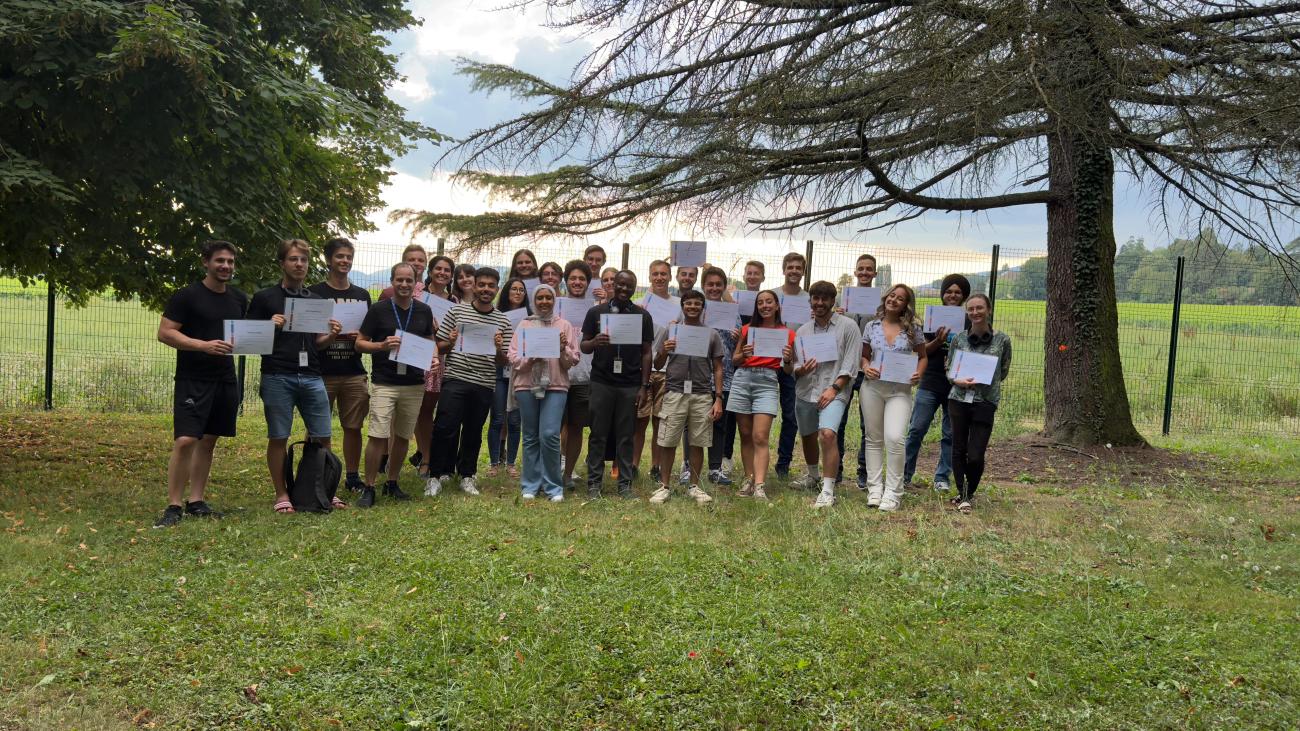CERN openlab’s collaboration with leading technology companies, including NVIDIA, Oracle, Siemens, and Micron, sponsors a nine-week summer student programme to motivate young and bright minds to join the research community and get hands-on experience with cutting-edge technologies guided by world-leading experts.
Over 20 joint R&D projects are being carried out at CERN through CERN openlab’s industry collaborations. This programme is open to everyone, including non-member state applicants, fostering a broader inclusive environment where everyone can apply and experience the cutting-edge environment of doing R&D at CERN.
This year, CERN openlab partnered with the Swiss chapter of the Women in HPC, an advocacy group called ideas4HPC co-founded by Maria Girone, head of CERN openlab. Ideas4HPC aims to promote inclusivity and diversity in HPC by creating targeted scholarships to support participation in top conferences or running training sessions for mentors. This programme specifically supported a summer student to promote more women in STEM spaces.
The summer student programme allows students to work with leading experts, establish ties to industry and gain new skills. 'Through CERN openlab, young students have the opportunity to work in a multidisciplinary cutting-edge environment with talented researchers that have a variety of different skills to share with them. Furthermore, engaging with the private sector exposes these students to frontier technologies, preparing them for promising future careers,' says Maria Girone, head of the CERN openlab.
Thirty students from 21 nationalities, out of over 6660 applicants, representing the universities below, were selected to work on quantum computing, machine learning, and other ICT projects. Last week, students presented brief overviews of their projects in a five-minute 'lightning talks' series explaining the challenges, problems and solutions they found.
Education and training are fundamental to the CERN openlab mission, which promotes open science and encourages innovation and creative thinking. 'It was inspiring to see students present the results of the work they have been doing for the past few weeks. I hope they found this opportunity as valuable as it was for us to have them here. It is an enriching exchange of experiences and knowledge for all of us,' says Antonio Nappi, CERN openlab CTO for Platforms and Workflows.
Applications for the 2025 CERN openlab Summer Student programme will open in November 2024.
Find out more details here: https://openlab.web.cern.ch/education/cern-openlab-summer-student-programme
2024 CERN openlab summer students:
Michal Mikolaj Wojcik, University of Warsaw
Cristobal Gimenez Devis, University of Bergen
Ali Hafez, Yale University
Nourhene Jallali, National Engineering School of Tunis
Jakub Ogrodowczyk, Wroclaw University of Science and Technology
Karanjot Singh, Jaypee Institute of Information Technology
Volodymyr Svintozelskyi, University of Valencia
Asal Mehrabi, Universitat Politècnica de Catalunya
Gehad Ahmed, The American University in Cairo
Annunziata Alvarez-Cascos Hervias, Universidad Carlos III de Madrid
Andrea Maria Ola Mejicanos, Berea College
Anastasiia Petrovych, Ukrainina Catholic University
Saumy Sharma, Institute of Technology Guru Ghasidas Vishwavidyalaya
Irina Bradu, Politechnica University of Bucharest
Riccardo Carissimi, Università degli Studi di Milano
Fabio Cufino, TU Dortmund University
Mouad El Haouari, Ecole Nationale Superieure d'Informatique (Alger)
Isidro Javier Garcia Fernandez, Universidad de Málaga
Mihail Codrin Iftode, University of Edinburgh
Tomasz Jan Kisiel, Cracow University of Technology
Christian Alex Klempau Funk, Pontificia Universidad Católica de Chile
Kacper Kamil Kozik, AGH University of Science and Technology
Thomas Mauran, Polytech Montpellier
Henry Mutegeki, Makerere University
Zeynep Ozturk, Dokuz Eylul University
Ruben Perez Mercado, Universidad de Granada
Mohammed Touami, Ecole Nationale Superieure d'Informatique (Alger)
Victor Virag, University College London
Siria Yerlany Sadeddin Mejia, Universidad Nacional de Colombia
Guilherme Paulino, Universidade Estadual de Campinas

